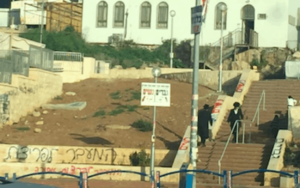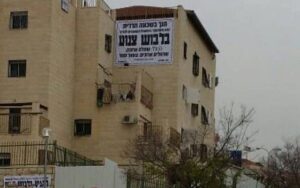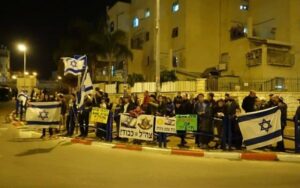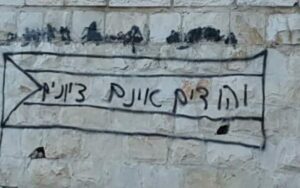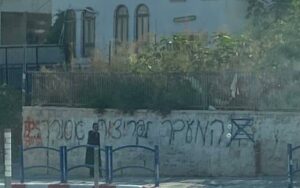Sign and graffiti designating women’s and men’s sides of the stairs, plus graffiti saying, ‘Passage for the immodest is forbidden.’ (Alisa Coleman)
I have been a Beit Shemesh resident for 13 years. I came here to raise my children in Israel. To be part of Israeli society and to live as a Jew in the Jewish homeland.
It’s a beautiful city full of religious, ultra-Orthodox (Haredi), secular, and traditional Jews, or it was when I arrived. But soon the beauty of the city was marred by extremism, by those who outwardly shared my religion, but somehow began to worship “modesty” above all, to the point that women were all but asked to disappear from the public sphere.
Slowly, I watched the women disappear. They were removed from advertisements and health clinic ads. Erased from posters and billboards. My daughters were told to sit in the back of the public bus on their way home from school be\cause “that’s where girls belong.”
When extremists came to the local Orot Banot girls elementary school and called little girls whores, I stood between them and the girls — and for my efforts, I was spit on by grown men in the pious attire of the ultra-Orthodox.
When extremists threw rocks at women’s heads — presumably emboldened by their modesty signs that tell women what they can and cannot wear and where they can and cannot be, I was there to protest.
When an IDF soldier was run off the road and crashed into a pole to avoid Haredim throwing rocks, myself and other activists staged a demonstration and called for an end to incitement against the Israel Defense Forces in our city.
When some Haredim made a practice of flinging dirty diapers and hurling eggs from their apartment balconies at our Modern Orthodox teenagers walking to volunteer on Shabbat afternoon, we were there to shepherd our kids through the mob on the street screaming at them.
Many of us Beit Shemesh residents, women and men, wanted our city freed from the demands of the most extreme elements in town. We worked hard to get an open-minded and tolerant mayor elected. She won, and we rejoiced in the miracle.
We had confidence that the graffiti calling women “whores” and Zionists “goyim” would never stand under her watch. We believed that the weak would be heard and the bullies put in their place.
This turf war is fought in a million little ways. Some want a Haredi city, with Haredi rules and monolithic Haredi values (never mind that Haredim are not actually of one mind). Others want to live in a city where no one population makes rules for the others.
Currently, a new neighborhood is under construction. It is actually the only local area of many new neighborhoods that is officially planned NOT to be fully Haredi. And its streets are being given names. The proposal was to name the 12 streets of this neighborhood after heroes and heroines of Israel: Anne Frank, z”l, Hanna Senesh, z”l, Roi Klein z”l (who died saving others in war), Ilan Ramon, his wife Rona, and son Assaf z”l, and so on. The Haredi members of the Beit Shemesh city council opposed the idea and argued against these street names. Too many of them were the names of women. Really. Too many of these heroes were Zionists. Yes, really.
The decision was made to use the last names of some of the honorees. Not “Anne Frank Street,” but “Frank Street.” “Senesh Street.” Or in the case of the three Ramons, not “Ramon Family Street,” but “Shelosha Street” — the Three.
When the press got wind of the changes, the religious Zionist female mayor, Aliza Bloch, whom we worked so hard to help get elected, claimed that the very notion that the name changes were to eliminate the women’s names was “Fake News.” Rather, the changes were simply to streamline longer street names with one word each, and have uniformity in that way. After all, the street named for Yoni Netanyahu z”l, another hero of the state, killed at Entebbe, was to become Yonatan Street, and the one named for Eliraz and Uriel Peretz, both killed in action in Israel’s wars, would be “HeAchim” — brothers.
But her claim is easily dismissed if you read the official documents on the chosen names and her spokesperson finally acknowledged in an op-ed that the Haredi political parties did indeed object to the women’s names.
So the names are abridged, you might say, and you can’t identify the heroines and heroes of Israel. So what? Who cares about street signs?
You should.
Because nothing stands on its own when the battle is all around you. Every move to erase or marginalize women or IDF soldiers is a step towards a larger goal. It is not about modesty. It is a fight for the core values of Judaism and Israel.
The Haredization of Beit Shemesh is real, the turf war is in full swing, and it is the city that loses. Yet years ago, when this kind of thing was new, those who acknowledged the changes said, “It’s okay,” “Let’s be sensitive,” “It’s no big deal,” and, of course, “It’s their world; it doesn’t affect us.”
And now large swaths of Beit Shemesh youth have been raised with the conviction that women and Zionism are treif, taboo, unclean.
You don’t have to care what’s happening in my town, but please please pay attention in your own community. When you see extremism, tackle it immediately.
- Don’t acquiesce to erasing women to be “sensitive” and “accommodate the needs” of those who won’t look at women.
- Don’t normalize women being relegated to the far side of a mechitza for anything other than shul.
- Insist that women be part of decision-making for your community/shul/school (though, as you see, women’s presence alone is not enough).
- Do not allow intolerance to be tolerated! Ironic, yes, but intolerance is the one thing we must refuse to tolerate.
For ourselves and for our children, we must stand our middle ground, for at the other end of the path lies the road to Beit Shemesh.
